

 On Tuesday the Los Angeles City Council voted, nearly unanimously, to implement a ban on all single-use plastic bags. Plastic bags have become an eyesore around our neighborhoods, but more importantly, they have been costing the City millions of dollars in clean-up. Despite these efforts, many still wind up in our sewer systems, with all too many flowing to the sea where marine life is harmed and various waterways themselves become polluted.
On Tuesday the Los Angeles City Council voted, nearly unanimously, to implement a ban on all single-use plastic bags. Plastic bags have become an eyesore around our neighborhoods, but more importantly, they have been costing the City millions of dollars in clean-up. Despite these efforts, many still wind up in our sewer systems, with all too many flowing to the sea where marine life is harmed and various waterways themselves become polluted.
The ban has been in the works since current Councilmember Ed Reyes introduced the idea nearly 10 years ago. This last year many hearings were held over many months, during which time stakeholders passionately presented the measure’s pros and cons. If it were not for the commitment of Councilmembers José Huizar and Paul Koretz, this ordinance would never have succeeded.
The most significant aspects of this measure are as follows:

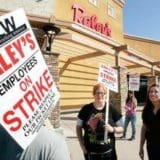
There’s power in the picket line. And employers know it.
That’s why, in 2008, Ralphs Grocery Company sued to have union picketers removed from the front of one of its non-union stores. But California has explicit laws to protect labor-related speech, and the court denied the request by Ralphs.
But that hasn’t stopped the grocery chain from continuing its courtroom battle to silence workers – even though they’ve lost just about every case. Last December, California’s Supreme Court upheld the ruling in favor of the picketers. Speaking for the California Supreme Court’s 6-1 ruling in the Union’s favor, Justice Joyce Kennard wrote that the 1975 state law and follow-up legislation passed in 1999 are
“. . . justified by the state’s interest in promoting collective bargaining to resolve labor disputes, and the understanding that the area outside the entrance of the targeted business often is the most effective point of persuasion.”
And last week,
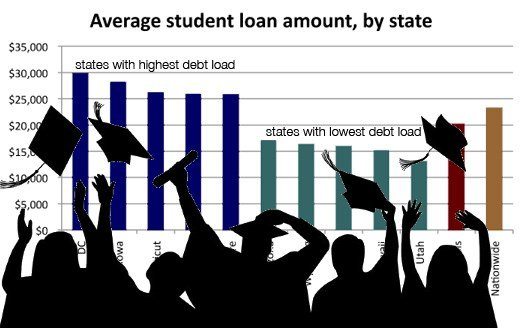
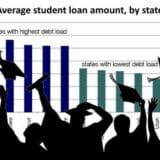
“Work hard. Get good grades. Go to a good school and you will be successful.” Our generation has been told time and again that through hard work and dedication, we will be able to live happy lives, have secure jobs, and start families built on comfortable finances. But on the day of action around student debt, it [was] clear we need more than these easy answers to help Millennials cope with the growing burden of education costs.
I come from a middle class family. Both of my parents served in the Marine Corps and got good jobs. My father works in law enforcement, and my mother is a teacher. They taught me that if I put in hard work, I would reap the results. So, I graduated at the top of my class in high school and went to a top (public) university. I worked all four years of college and graduated on time.
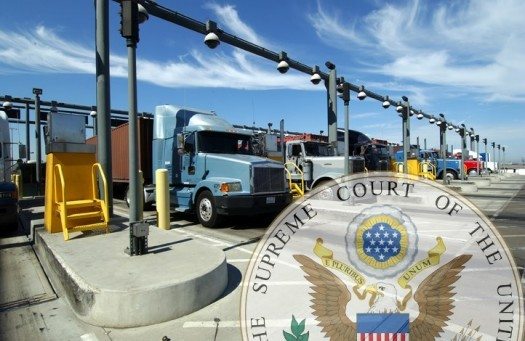

Last Thursday the U.S. Supreme Court ruled in a case that had the potential to impact millions of people in Southern California – people who have been breathing cleaner air thanks to the Port of L.A.’s Clean Truck Program. The Clean Truck Program is an innovative policy that has been successful in reducing port-related truck emissions by as much as 90 percent. But it has enemies, most notably the trucking companies who profited from the dirty, unregulated system as they worked on behalf of Walmart, Target, and every other big importer.
The national trucking lobby, on behalf of these firms, sought to kill the program by challenging it in court. As we passed environmental and public health milestone after milestone, the trucking industry filed legal motion after legal motion, and the case bounced between all levels of courts. But Thursday was the big one—the highest court in the land finally weighed in on the legality of the program overall.
» Read more about: Supreme Court Blocks Industry Bid to Kill Clean Truck Program »
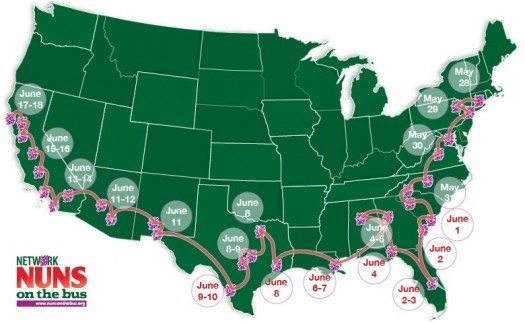
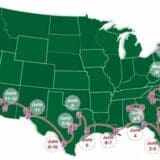
A group of nuns began their 6,500-mile bus journey late last month in New Jersey with a view of Ellis Island. Since then, their brightly-decorated blue bus with images of hands raised — to show support for families and immigration reform — has rolled for more than 5,000 miles down Eastern Seaboard roads and into the South. This week marks the California leg of the “Nuns on the Bus” tour supported by NETWORK, a national Catholic social justice group. The nuns’ goal during this 15-state, 40-city whirlwind event which ends on June 18: “Standing with immigrants, faith-filled activists, and Catholic Sisters who serve immigrant communities.”
Last Wednesday, the nuns were scheduled to speak with community groups in Nogales, Arizona and federal lawmakers in Phoenix. After the meeting with government leaders in Phoenix, they joined immigration groups to discuss the tour, the importance of family unity and citizenship for 11 million undocumented immigrants in the country,
» Read more about: Nuns on the Bus Tour to Reach San Francisco Today »
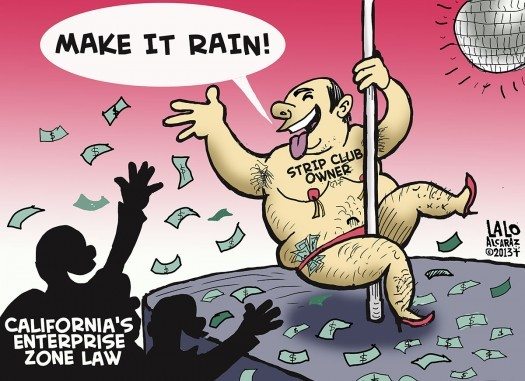
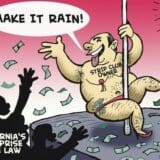
In How Enterprise Zones Are Killing the California Dream, Frying Pan investigative reporter Gary Cohn looked at the impact of the controversial program, including workers who lost their jobs while their former employers received tax breaks for hiring lower-paid replacements. He also reported on two strip clubs revealed to have benefited from the secretive program. Other media have picked up the story as well, building momentum for an overhaul. A more detailed overview of the Governor’s plan can be found here. The following post first appeared in the blog Labor’s Edge.
To some politicians, economic development means giving hundreds of millions of taxpayer dollars to strip clubs, fast food joints and retail giants like Walmart. Gov. Brown, thankfully, has a better idea. Today, the Governor announced a broad coalition of labor, business and others in support of his good jobs plan that will flip the broken enterprise zone program into real incentives for creating quality,
» Read more about: Governor Brown Outlines Plan for Good Jobs »


Words of Fire, the Frying Pan’s new poetry section debuted this week with a series poems the new mayor should read.
These five poems by some of L.A.’s finest poets are intended to help Mayor-elect Eric Garcetti look closely at our city and listen with care to its diverse voices, from janitors to sidewalk fruit sellers to donut shop insomniacs. They are also an antidote to the platitudes of the campaign trail, and a reminder that the best political speech – and acts – can tap into people’s deepest emotions and aspirations.
A Model of Downtown Los Angeles, 1940
 The oldest Mercedes in California adorns
The oldest Mercedes in California adorns
the crowded foyer of the L.A. County Museum
of Natural History, and babies shriek like bats
in the elevator that lowers my daughter
and me to the basement….
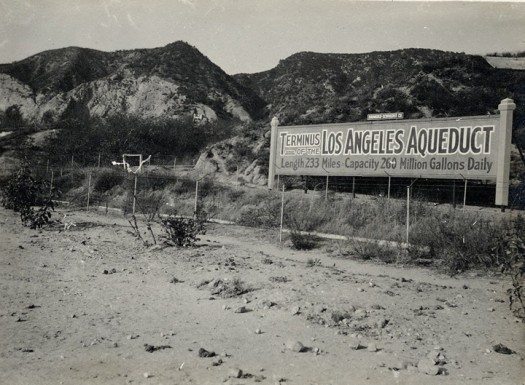

It’s a bright, guilty world.
–Orson Welles in The Lady from Shanghai
But there is no water.
–T.S. Eliot, The Wasteland
The oldest Mercedes in California adorns
the crowded foyer of the L.A. County Museum
of Natural History, and babies shriek like bats
in the elevator that lowers my daughter
and me to the basement. There, among the faint,
intermingled drifts of ammonia and urine
from the men’s room, phantom display lights
luring the shadows over the inventions of Edison
and Bell, and dusty monuments to a century
of industrial progress, lies the mock-up L.A.,
whose perusal has been assigned to my daughter’s
fourth-grade class in California history.
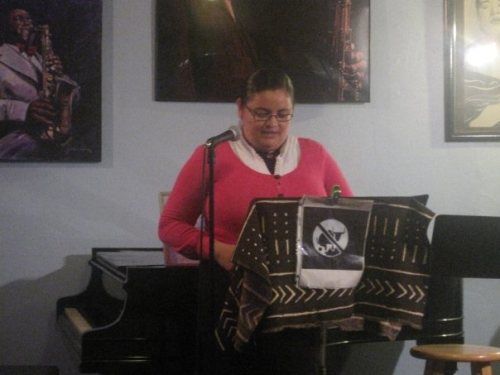

As dawn breaks through the crimson curtains,
you rise, kiss Amá goodbye, the only time
I see you do this, drive away,
circles of dust and tire marks remain.
You return four months later with the trunk full
of crates of strawberries peaches, apricots,
grapes, and plums. The nectar seduces our lips,
seeps through our fingers. Our nights fill
with dreams of this Garden hidden
in the center of the valley.
Most nights you sit in the dark, whisper
about a scornful sun, of being forced
by a landowner to hold a blue whistle
between your lips so you won’t be tempted
to consume the fruits you pick. The sound
of whistles merged with the rustle of the wind
fills the fields like a bird song.


How a union of Yale employees aligned itself with community activists and won control of a beleaguered city.
This article and illustration originally appeared in The American Prospect.
Major Ruth became a civic leader because he made a promise to his neighbor, Brian Wingate. Both had moved to the Beaver Hills section of New Haven, Connecticut, in 2003. A neighborhood of aging single–family homes that had seen better days, Beaver Hills had been targeted by the city for a housing–rehabilitation program, and, with the zeal of new arrivals, Ruth, a manager at the local utility company, and Wingate, a custodian and union steward at nearby Yale University, sought to involve themselves in neighborhood–improvement ventures. That proved harder than they had anticipated. Although New Haven aldermanic districts are tiny, encompassing no more than 4,300 residents, Ruth and Wingate couldn’t find anyone who could identify,